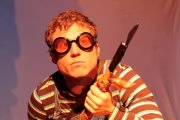Hendry and Dwaine are two small-time crooks sit on a bench, psyching themselves up for their next job. But, as we soon discover, they’ve got a lot more at stake than just getting caught. So begins Bench, a new play by Brent Palmer, currently running at the Kalk Bay Theatre.
Directed by Michael Kirch and starring Brent himself opposite the talented Adrian Collins, this production is a real pleasure to watch. It’s that great combination of strong script, spot-on acting and sound direction – the type of all-round winner that you always hope to stumble across. The script, for instance, is chock full of wit without being a one-dimensional comedy, with the acting being as multi-faceted and layered as the text.
It would be easy, given the South African petty crook stereotypes Palmer ostensibly deals in, for the characterisation to give way to being flat-but-funny. Although easy laughs are there for the taking, the actors constantly deliver more, making Hendry and Dwaine complex and believable, even as they are instantly recognisable.
Brent Palmer has the greasy conman down to a tee – his slimeball Hendry hits the stereotypes, gets the laughs, and still somehow manages to find the pathos in the midst of the slick patter. His character is full of brash bluster, but still a man at rock bottom and Palmer manages to give us a tragically fragile veneer of manner that inspires pity even while being thoroughly unlikeable.
By contrast, Adrian Collins is wonderfully subtle with the complex and reserved Dwaine. The laughs his character gets cost more, they tug at something much darker and push the comedy to the edge of its genre as he carefully reveals a man working against the odds to get his life on track. Collins’ performance is a masterclass in understatement – his gestures are contained, his delivery gruff. It would be easy to focus on the more dynamic and expansive Hendry, but you’d be missing out on a truly exceptional moments that Collins delivers. For a white boy from the CBD, his surprising Cape Flats accent is outstanding and hilarious and utterly tragic, all at once.
Script-wise, there were a few moments where I had to suspend disbelief, where I wasn’t quite sold on the characters’ motivations to act the way they did, but these are minor quibbles. The work the team have put in makes Bench a show that’s deserving of your time to sit and linger.






